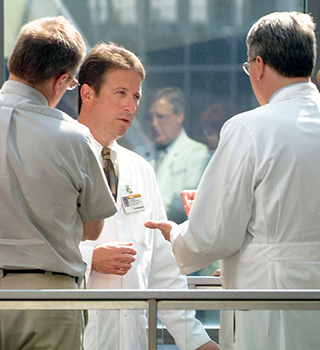Facing the diagnosis of a brain tumor can be challenging. It is normal to feel worried or overwhelmed.
At the Comprehensive Cancer Center, we understand. We put your needs and concerns first every step of the way - from diagnosis through treatment and survivorship. We combine compassionate, patient-centered care and the most sophisticated cancer-fighting tools in the world to offer our patients the best possible outcome.
Why Choose Wake Forest Baptist for Your Brain Tumor Care?
Patients from around the region and around the world choose us for their care because of our approach. Highlights of our care include:
- The region’s only multidisciplinary brain tumor clinic: Our specialists work together to bring every available resource and approach to treating our patients.
- The only NCI-designated Comprehensive Cancer Center in the Triad and Western North Carolina: This means patients have access to the latest treatments and clinical trials.
- Over 20 years of active participation in the Adult Brain Tumor Consortium (ABTC): We’re one of only 11 brain tumor centers in this selective, NCI-sponsored consortium. ABTC introduces new drugs and treatments using early phase clinical trials, and proactively collaborates with other researchers and groups.
- Active and focused reviews of our patients’ progress: We hold a weekly Brain Tumor team conference to discuss individual patients’ care and treatment strategies.
- One of the most active Gamma Knife® programs in the country: Gamma Knife delivers precise doses of radiation directly to the brain tumor while sparing healthy tissue.
- One of the earliest and most experienced adopters of laser ablation technology: We were one of the very first to use this method for destroying brain lesions, while sparing healthy tissue.
- Dedicated brain tumor patient coordinator: Our coordinator’s responsibility is to support you and make sure you have the best care possible.
- The Cancer and Cognition Clinic: Ours is the only clinic of this type in North Carolina, and one of only a few in the country, that helps patients understand and manage the changes in cognition that can happen with brain tumors and treatment.
- The region’s only dedicated Pediatric Brain Tumor program: The program is led by a team of pediatric neuro-oncologists, pediatric neurosurgeons, radiation oncologists, pediatric neuropsychologists and neuro-oncology research experts.
- Patient and family support services: As you and your family navigate through the treatment process, we offer a broad range of support through patient and family support services.
About Brain Tumors
Brain tumors are clumps of tissue in your brain made up of cells that grow abnormally or uncontrollably. Brain tumors can either be:
- Benign, meaning non-cancerous, slow-growing, and can be removed
- Malignant, meaning cancerous, fast-growing, and likely to invade healthy brain tissue
We also identify brain tumors based on where they begin growing. Primary brain tumors begin growing in the brain itself. Metastatic brain tumors have spread to the brain from other parts of the body, like the lungs, breast, and skin.
Types of brain tumors include:
- Acoustic Neuroma: Arises from cells that form a protective sheath around nerve fibers; typically grows around the eighth cranial nerve, but can be found around other cranial or spinal nerves
- Pilocytic Astrocytoma (Grade I Astrocytoma): Slow growing, with relatively well-defined borders; grows in the cerebrum, optic nerve pathways, brain stem and cerebellum
- Low-grade Astrocytoma (Grade II Astrocytoma): A slow growing type of glioma that develops from star-shaped cells (astrocytes) that support nerve cells
- Anaplastic Astrocytoma (Grade III Astrocytoma): A glioma that develops from star-shaped glial cells (astrocytes) that support nerve cells, but grows faster and more aggressively
- Glioblastoma (Grade IV Astrocytoma): A fast-growing and aggressive malignant tumor that can occur in the brain or spinal cord
- Medulloblastoma: A type of primitive neuroectodermal tumor (PNET), often located in the cerebellum or near the brain stem; occurs most often in children under the age of ten, but may occur in adults.
While we don’t know exactly what causes brain tumors, we do know that they can influence your ability to think, feel, and move - and they can affect both adults and children.
Symptoms and Diagnosis of Brain Tumors
Sometimes, brain tumors don’t cause any symptoms. However, some people experience headaches, numbness or tingling, muscular weakness, mood and personality changes, or seizures.
To diagnose a brain tumor, doctors will perform a neurological exam, and use an imaging scan, usually a CT scan or an MRI. To confirm the type of tumor, the doctor will need to remove (or resect) the tumor, or perform a biopsy, which involves taking a small sample of tissue for testing in a laboratory.
Brain Tumor Treatment
Our specialists are your team - and your input is essential to every decision we make. Once we have a diagnosis, our team works with you and your family to develop the most effective treatment plan. Treatment may include brain surgery, chemotherapy, radiation, novel therapeutics, and as well as participation in clinical trials.
We are also home to one of the most active Gamma Knife® programs in the country. In most cases, Gamma Knife is an outpatient procedure that delivers precise doses of radiation directly to the brain tumor while sparing healthy tissue.
Advanced Brain Tumor Treatment Options
Optune may offer benefit in patients with newly diagnosed tumors, and is as effective as chemotherapy with fewer side effects and a better quality of life in select patients with recurrent disease.
Visualase® and NeuroBlate System - A minimally invasive procedure, Visualase provides precise, advanced MRI-guided laser ablation technology to destroy brain lesions. As laser energy is delivered to the target area through the NeuroBlate high-intensity laser light, temperatures in the target lesion begin to rise, destroying the unwanted tissue while limiting injury to healthy tissue.
Precision Medicine Program - Patients who are not responding to treatment may be candidates for our Precision Medicine program, which uses the DNA of the patient’s tumor to identify the most promising treatment options, including the use of medications not typically used for brain tumors.
Brain Tumor Clinical Trials
The Comprehensive Cancer Center’s robust research and clinical trials program is focused on testing and finding innovations in brain cancer detection and treatment. Due to the depth of our neuro-oncology research program, we’re able to bring the best of our clinical and translational research to patient care. Current clinical trials.
Pediatric Brain Tumor Program
The Pediatric Brain Tumor Program at Brenner Children’s Hospital is the region’s only dedicated pediatric brain tumor program, and is led by a team of pediatric neuro-oncologists, pediatric neurosurgeons, radiation oncologists, pediatric neuropsychologists and neuro-oncology research experts. An important feature of the program is that children and teens with central nervous system tumors can see all of their doctors in one location. The program is committed to excellence in child- and family-centered care, cutting-edge research, and high quality education in order for patients to achieve the best possible outcomes.
Cancer and Cognition Clinic
Brain tumors and their treatment can impact cognition, including short-term memory, the ability to focus, and other thinking skills. Our Cancer and Cognition Clinic is the only clinic of this type in North Carolina, and one of only a few in the country.


 This program (also known as the Neuro-oncology Patient Coordinator Program) can help you and your family navigate through our health care system.
This program (also known as the Neuro-oncology Patient Coordinator Program) can help you and your family navigate through our health care system. 